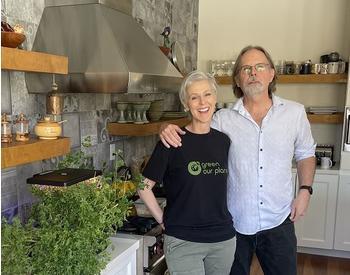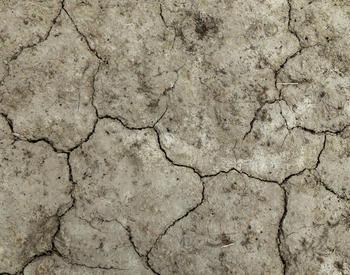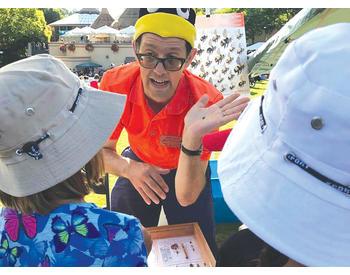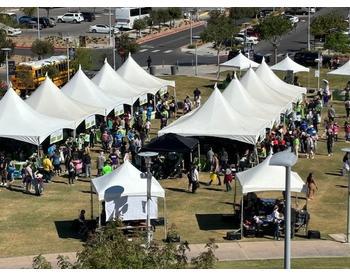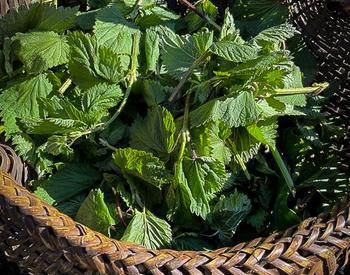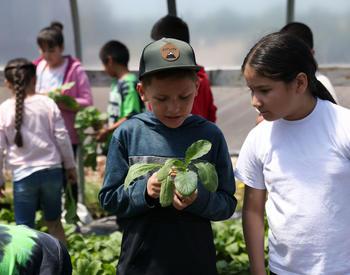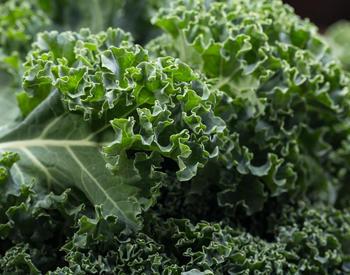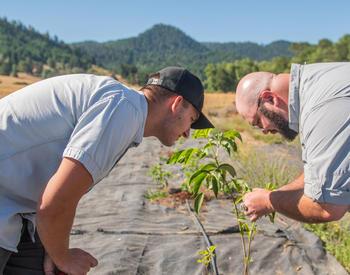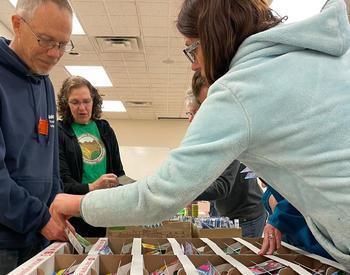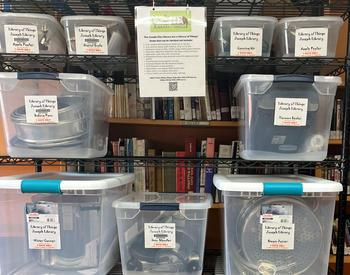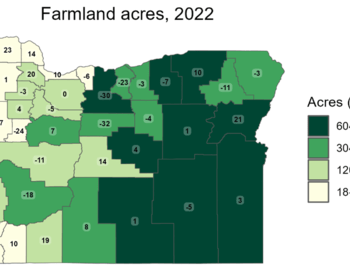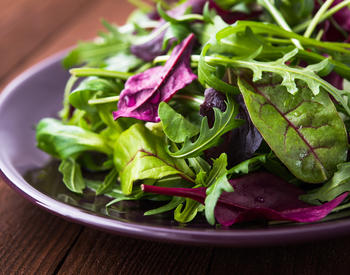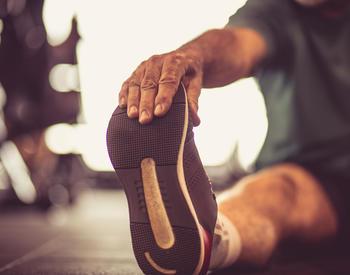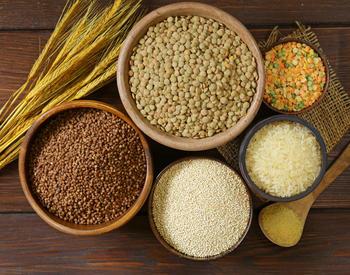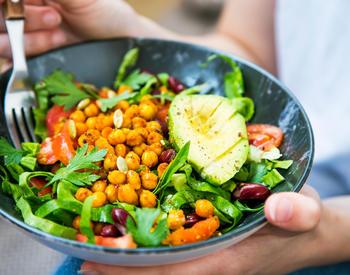Transcript
00:00:16 Rick
Welcome to the farm to school podcast where you will hear stories of how you thrive and farmers prosper when they grow, cook and eat delicious, nutritious local food in schools.
00:00:26 Michelle
We're your hosts, Michelle Marksteyn.
00:00:28 Rick
And I'm Rick Sherman. We are the farm to school coordinators for the state of Oregon.
00:00:34 Rick
So, Michelle.
Michelle
Hey Rick
Rick
Hello, welcome. This is our second part where we are interviewing hosts and we have a lot to unpack because it's my turn to interview you. Michelle Markesteyn. And it's so surreal because literally, you've done everything.
00:00:36 Michelle
No, no.
00:00:56 Rick
In farm to school in the state of Oregon, you've been in so many positions. It's it's you've you've literally been everywhere. But you're one of the go to people in the country for farm to school. You always have been. You're one of The Pioneers, if I can use that term, in farm to school. So did you always want to be a state agency farm to school person?
00:01:22 Michelle
That's a very funny question. Did I always want to be a part then? It it was not even a profession. It was not even a term. It's something that's we've known for about 20 years. And I was thinking back, like, what are those pivotal moments, you know, when your life changes in a second? And it was about 2004 and I was an emergency credential teacher for the state of California for environmental science and math for high school, and I was teaching at the first ever youth initiated high school in the country. It's called the Bay Area School of Enterprise.
00:02:00 Michelle
And it was amazing. It was like a couple of students with two adults got together and wrote a charter and created a school because they wanted to do project-based learning.
00:02:10 Michelle
Where was this at in California, Alameda, CA, near Oakland. And yes, that's exactly where it is. And so it's the first year high school students actually interviewed me and hired me. And during the course of the year, many of these students were the first students who ever g raduated high school, which for me was also the case. My father never finished high school. He immigrated to this country shortly after World War 2, and so at the time I was in a Graduate School program, actually a doctoral program at Tufts University.
00:02:44 Michelle
So to see these kids graduating high school and you know, it's pushing them to find their passion and do their thing. And literally one of them blew up at me, and she said, “you say, ‘find your passion’. And ‘what color is your parachute?’ But if you were really honest with yourself, you would either be an aerobics instructor or do your doctorate on the school gardening.”
00:03:06 Rick
Why did she say that? The aerobics instructor?
00:03:09 Michelle
Well, I'm. I'm pretty energetic I guess.
00:03:12 Rick
You are. You're a ball of energy, yes.
00:03:15 Michelle
And in the classroom, I'm very energetic as well. So I took that. Like I said, I was doing a doctoral program at the time I had gotten through all of my coursework, and I was defending to do my research on farmers attitudes, knowledge, and behaviors towards climate change. And in that moment, when she was saying you should do school gardening.
00:03:36 Michelle
That's where your passion is, I thought.
00:03:40 Michelle
You're right, I should be an aerobics instructor.
00:03:44 Michelle
So I did.
00:03:46 Rick
I thought you were going to say you're right. I should be a school garden person.
00:03:49 Michelle
No, I've never taken the path of least resistance. I kind of always been that salmon swimming upstream, so I did more physical activity and then this one student. Helene. Hey, Helene. If you're out there and we're still very close, more than 20 years later. Helene did her senior project in high school on a community garden and in Alameda where we were was on an old Navy base. And it was also a place where folks with HIV survivors of domestic violence, other mixed economic incomes were there and this community garden build day, more than 300 people came and built beds together, worked together, ate together, plan together, and it changed my life.
00:04:39 Rick
Well, I was just going to say it sounds like that was a pivotal moment for you, yeah.
00:04:44 Michelle
It was a huge, pivotal moment and I was like, I'm glad I workout a lot so that it's easy to build these school gardens and do the physical activity with the kids. It's a lot.
00:04:53 Rick
It could be a lot of work of work, and I am going to do my doctoral research on school gardens.
00:05:01 Rick
Had that ever been done before a doctoral like to do a doctoral research?
00:05:07 Michelle
So I started a doctoral program in 1999 and at that time I think there was maybe three people who had done a doctoral level reset, and the feeling at Tufts University was like, yo, Michelle, this is not actually a field of study school gardens. Like, there's anecdotal evidence. It's called a lot of Gray literature, but this idea that you would do your dissertation research, there's not even a theoretical framework for how and why school gardens do what all the magical things we think they do. So I was like, ohh, great then we'll just create a theory. And they're like, what are you talking about? And I didn't honestly know any better. It sounds like I have a super fancy academic pedigree and I do. I'm very lucky and work really hard, but the reality is, is that I graduated high school with about an eighth grade reading level.
00:06:05 Rick
That part is crazy. I've heard that story before. Please expand on that a little bit.
00:06:08 Michelle
ohh about about.
00:06:11 Rick
Yeah. Go back. Go back to young Michelle
00:06:11 Michelle
My experience. Yeah. OK. Because life is like a giant slinky, right? It keeps circling back on itself and hopefully we grow a little. That's my view of it anyway. OK. And so, you know, that school garden in Alameda was pivotal, but actually, many of the seeds for that moment were planted earlier on in life. You know, when I graduated high school with about an eighth grade reading level, I was dyslexic and super challenged. At school like, That sit-down at a desk learning environment was not for me.
00:06:50 Michelle
Some advice that I got from my mom and kind of drilled into my head was I have one sister, older sister Kathleen, and two step sisters, Lisa and Krista, and the whole story was girls, you got to learn how to have a career and take care of yourself and your family because you never know what happens in life. That's good advice. That was good advice and I was like, well, great. I will have a career. I will.. Sell earrings at Grateful Dead concerts.. That's not what she Meant.. I was like “No? Ohh, OK then I will grow food.”
00:07:28 Michelle
And I got my start in growing food in my upstate New York suburban backyard. It was 1988 when I first started gardening and my mom wouldn't take me to the mall for get my ears pierced for the third time. It was the 80s, you know Cindy Lauper. Girls just want to have fun. You just gotta kind of picture it. And I was so mad at her that I was like, let's do it myself, which is really gross. I just like, stuck a safety pin through my ear. And I was so angry. And I had like so much energy. I took a shovel and I completely within a week transformed my parents suburban backyard into just Oasis Gardens. And it was like in that moment of, like, my worst anger and frustration. As a youth, I just found peace and digging in the earth and was so grounded.
00:08:24 Rick
You know, it's funny you say that because there's studies that actually show people that, especially for youth, something happens when you put your hands in the dirt. There's a calming effect and maybe I should like we could put that in the show notes I. There's a couple of studies in there, but especially like we hear that at alternative schools where you interview the kids and they'll say if I would have known this was here.
00:08:50 Rick
It would have changed my life so much earlier, you know. But yeah, I appreciate what you're saying
00:08:54 Michelle
Well and that's it, right. The other thing, there's now research on, but was my lived experience was garden. Eating, growing food, eating food. I had grown like the light bulb went on for me. I got interested in school. I started caring about myself. I started caring about the earth, the world, the environment, my community, where before I was a punk kid, like peace out all of a sudden growing food and gardening changed my entire life and my family's life. Yeah, so to have that experience as a youth and then just kind of bumble along in what I did. And then, you know, basically 15 years later be with high school youth again and to have that experience, so many things came crashing together for me.
00:09:48 Michelle
So I now was like I'm doing dissertation research on school gardens and...
00:09:56 Rick
OK, thanks for catching us up on that, that that makes that's really valuable background.
00:10:02 Michelle
OK. And if I didn't have all those experiences, I never would have been able to do the theoretical research and foundations that I've done that shows how school gardens right changed the curricular, physical and social learning environments in schools that influences development of the whole child.
00:10:15 Rick
OK.
00:10:18 Michelle
And so it's directly from all those like lived experiences I had.
00:10:21 Rick
OK, so you did your dissertation at Tufts and then? And I think after that then you you probably moved out West up to Portland?
00:10:29 Michelle
Actually, I was already in California that whole time, so Tufts is in Boston. But, you know, I was like, the the one of the few domestic ones, most of those programs are international, OK.
00:10:32 Rick
OK. Right. So then what happened?
00:10:41 Michelle
Well, one of the parts of the study was I could see clearly that you can change what kids think know and feel about food. But you're not going to change what they eat unless it's available to them.
00:10:52 Rick
I've heard that before. From you, yes.
00:10:54 Michelle
So I got really curious about how do you get like really delicious local foods in schools and then hooked up with lots of folks who were, you know, again it wasn't called Farm to school then, but some of those things ideas were percolating up and, you know, moved from California up to Oregon.
00:11:16 Michelle
Oregon was an intentional move because at that time in my life, right, I was doing a doctoral program. I had just gotten married a couple of months later, my dad died literally six months after that, my mom died. I was probably like 28 years old and was like, whoa, I need to be grounded. And so, we came up to Oregon to get a farm, raise a family and just put down some deep roots.
00:11:44 Michelle
And in coming here, I was like, oh, this is what I do. I'm a school garden person. So I went and met with the Director of Education, and I went and met the Child Nutrition program director, then Joyce Dougherty. And you know, it was just like, hi, I'm coming to Oregon. And I think there's this one moment where we're getting to know each other was going to conferences and it's a little bold, but this is what you do. I just said, hey, I will be acting as the state school garden coordinator until you hire me or tell me to stop.
00:12:21 Michelle
Wow. And that's how I got the position at the Department of Education. Ohh wow. And that what?
00:12:26 Rick
What year was that?
Michelle
About 2008.
00:12:28 Rick
2008 OK. All right.
00:12:30 Michelle
And so I actually hadn't defended my dissertation yet. I was doing that on contract with the Department of Education and started at that point, the child nutrition programs was like, gosh, there's lots of people talking about local foods. Let's get them together. And so Joyce kept convening people and asked me to facilitate this group, which then grew into the Oregon farm to school network.
00:12:50 Michelle
And in that time we kind of really glossed over this, but before I did a doctorate, I actually went to law school and did a Masters in environmental law and policy and as part of that, I interned for the Legislative Council, the Vermont State Assembly, and learned how to draft an amend language. So in 2006, when we're sitting at meetings in Portland and somebody says “Gosh, we need money from the state legislature.” I was like, oh, well, we just write a bill. So we did. We just literally wrote a bill and then there were legislators who were like, we need policy concepts. And guess what? We had a bill ready for them and some policy concepts ready to go. So.
00:13:35 Rick
Well, weren't you? So first of all, that Bill was that the bill that introduced the position that I have now because that was one of the bills you helped introduce.
00:13:49 Michelle
So I came to Oregon with a lot of energy and like you heard about these bills, I wasn't working for anyone particular at that point and then started working for ECO Trust. Deborah Kane, who went on to really shape and found farm to school, community food systems at the USDA, was an eco trust at that time. And it was really funny. We were kind of behind the scenes I was like, hey, Deborah- I want you to hire me to be the farm to school director at Eco Trust and we need to work on policy..
00:14:21 Rick
That sums up Michelle everybody because that's what she does. She'll she'll figure out a way to create a position for herself, and she'll see the need. Like she said, she'll to get the work done. Yes, it's just, it's amazing. So if anybody needs something done and it and it's in her wheelhouse and her passion. There you go.
00:14:28 Michelle
Well, to get the work done. The recently got the work done. Thank you, but well, along the way. So we kind of flew under the radar for a while because at that time, ecotrust did not work on policy.
00:14:47 Michelle
And it's, you know, a lot of nonprofits think they cannot be advocates, and that's actually not the case. You can't spend more than X percent of your budget on advocacy, but the reality is, is we all are advocates and.
00:14:59 Rick
Except for me because I work for state agency and, explain that part of it.
00:15:04 Michelle
Ohh sure, except for, me too.
00:15:07 Rick
Yeah, talk about advocacy because that like I that's that's a hard one to get. What does?
00:15:13 Michelle
What is advocacy? Well, it can mean a lot of different things and be very different specific ways of going about it, but let's take this instance of farm to school and.
00:15:26 Michelle
There was an idea of let's get schools money to buy food. Schools don't have enough money to feed kids so that they can. OK, well, on its own you would say, ah, people are already spending tons of money on schools. We don't want to give them more money.
00:15:45 Michelle
Umm, but if you say, how about we give them money to spend on Oregon agriculture? Now you have folks who advocate for nutrition, love, nutrition and now you have AG folks and advocates for agriculture coming together. So that's a way of shaping policy to increase the number of folks who will advocate on behalf of it.
00:16:09 Rick
OK, that makes sense. But and so there are people that can like you were saying, can advocate to the legislatures and some that it's not in their job purview to do.
00:16:21 Michelle
Like you as a state agency and me at Oregon State University, we can provide information in our roles, but we wouldn't advocate to the legislature. So 15 years ago I would go knock on the door of a legislator and say, hey, there's this bill that we drafted and we want you to Co sponsor it and we want you to support it and here's why it's important. And that's how we would drum Up support.
Rick
OK, thanks. That really answers questions that people would have for that. Thanks for tying it up. So nice with a little bow.
00:16:55 Michelle
I have one more story that's super fun. I was recently thinking about of farm to school policy in Oregon, so I postponed defending my dissertation to present to the Oregon State legislature the farm to school bills for the first time, and to decrease barriers and increase opportunities, you know, drive demand and supply for local foods and schools. And so we asked for a position in the Department of Education, Child Nutrition programs to really ready the buyers a position in the Department of Agriculture to smooth out issues related to supply and distribution. And then?
00:17:34 Michelle
Because it's a holistic systems approach that's just money on the plate, you also have to be able to, you know, engage kids and teach them about where their food comes from. So they're more likely to try it and eat it.
00:17:46 Michelle
And if they eat it, then the schools are going to buy it?
00:17:48 Rick
That's right. OK. Yeah.
00:17:49 Michelle
So that was the whole systems approach. We asked for $22 million, it was laughable, but here we are introducing the idea for the first time. I think it was 2007 legislative session and you know I was nervous. I had never presented at a legislature before and there's just this process, right. You have about 12 people. Just you, stone faced. With microphones, the whole thing, and everyone's standing behind you and all these state agency folks.
00:18:15 Rick
And you're being recorded for the record.
00:18:20 Michelle
And these folks are like. Who are these advocates? what are they doing? Really tense.
00:18:25 Michelle
And at the end of my presentation, the chairwoman. I'm sorry, miss…. Not knowing her name right now, said: “I started as a lunch lady. and I worked my way up. Became Superintendent of my school district out on the coast of Oregon. And I love education so much. I spend my time as a legislature here in the education subcommittee.” So she got it.
00:18:52 Michelle
She got it to her core and she was able to under score the importance of school nutrition and agriculture education, and it was a game changer.
00:18:54 Rick
Yeah. And you know, that's been with my experience in testifying to legislature too. We have people on… They're legislators that are farmers that get it too, you know, they're they're they're parents of kids that go to K12 education. So it's been nice to make that connection. We are fortunate to live in a state where both sides of the aisle have seen the value in this.
00:19:33 Rick
OK. So you mentioned that you introduced bills and I think one of those was mine that that created my position so thank you very much, but wasn't one of those one the one that you grew into as well?
00:19:48 Michelle
Right, the farm to school manager at the Oregon Department of Agriculture. It was first held by James Beard award-winning chef Cory Schreiber, who actually created Pacific Northwest cuisine.
00:20:01 Rick
Oh yeah. Hey, Corey, if you're out there!
00:20:03 Michelle
There and I was at Ecotrust at the time. And so I did. I went to the Department of Agriculture to establish programs and really try to flush out. Like, what is this? And I'm sure as you did when you started, it's pretty tricky. There's no road map. There aren't state. We were the Oregon was the first state to have positions in two state agencies and we didn't have job descriptions. We used to joke that I would rewrite my job description every three months within the state agency, which is very unusual. It is also challenging because then there was what? What are your performance metrics like? What are you being measured against so worked really hard to, you know, figure out what is. The role of a state agency.
00:20:44 Rick
But in terms of that, Oregon Department of Agriculture, the neat thing that that how I explain the difference to people like we have two positions now Michele's not in that position anymore. I have my counterpart. Her name is Amy Gilroy. And so when somebody comes up to us and says, hey, I'm a farmer, I want to get my produce into the schools, I will refer them to Amy. And if somebody comes up to her and says I am a parent and I want to know more about Farm to school, my school, she will refer them to me. So I work from the schools out and the department of AG works from farmers, ranchers, producers into the school. So we kind of tag team it from a different latitude I guess.
00:21:29 Michelle
That is the way to do it. I like how you frame that up.
00:21:33 Michelle
So at the Department of Agriculture, right, this is a new position created by the legislature farm to school. There's no road map. There's no way to know. What is it that I'm supposed to do? So I spend a lot of time asking folks, school food service directors, like, well, what do you need?
00:21:50 Michelle
You need and you know in about 2009, 2010 schools were saying, well, I'm starting to buy local, but nobody knows.
00:21:59 Michelle
So we're like, hey, let's do this campaign. So we did the organ harvest for school's campaign, which is now housed and run at the Oregon Department of Education, and lots of states have harvest of the month or pick of the month or some type of social marketing campaign.
00:22:13 Michelle
And then we kind of asked like, OK well, what else do you need? What else do you need? And they're like, OK, we're buying it. We're telling people about it. They're starting to know about it, but that doesn't mean the kids are eating it. Kids have to have positive, multiple experiences with the food in order to try it, and if they do we'll buy it. So we were like, OK, what do we do? So how do we upscale basically and bring to scale school gardens and agriculture education in Oregon. So at that time, the Department of Agriculture housed Food Corps. It was new National service program. It's in the AmeriCorps family. And we worked with folks all over to increase more school gardening. That connections between the cafeteria and the classroom.
00:22:59 Michelle
And then it was like, OK well. What do you need? say schools, what do you need to buy more Oregon agriculture. And they said OK, we're buying it. We're telling them kids are starting to have more experiences, although we need lots more. But the community has no idea what we're doing in the broader sense, and this food is not available to them outside of the school environment. So we're like, oh, right. Cafeteria, Classroom, Community. What can we do as a state agency to really address the community? And we came up with this multi platform media campaign called celebrate Oregon agriculture.
00:23:33 Michelle
And we really just brought to life stories of what schools were doing. And, you know, like a cool little cooking shows. But of school recipes. So really engaging families in that way too.
00:23:48 Rick
I know that's a great Oregon AG ad, I love to go back into my files and and recreate some of the recipes you shared on on the local TV station. We have our Oregon cranberry chutney. Oh man, I that is a tradition in our household. I bring every holiday and and it's. But it's like local pears, cranberries, hazelnuts. And yeah, it's it's one. Hey, we'll put a recipe in the show notes! Yeah, let's do it. So yeah, much appreciated and good work.
00:24:17 Michelle
Let's do it.
00:24:22 Michelle
Well, and then at that time I was thinking, you know, if we really are going to institutionalized farm to school and school gardens, it has to be commercializable. And what do I mean by that? Well, a lot of the activities were largely funded by grants from either the state or, you know, millions from philanthropists.
00:24:41 Michelle
A lot of folks are volunteering their time and you know there's only so much you can do without the actual capacity and resources of time, talent and treasure.
00:24:53 Michelle
Right, so I went to Truitt family foods and we started a National School food service company in part.
00:25:01 Rick
What does that mean? National.
00:25:04 Michelle
OK, so I went to Truitt Family Foods to launch a National School food product. We did shelf stable hummus from sustainably produced beans in the northwest and it would meet like and they call it in schools, meals, credit. It counted as a meat or meat alternate as hummus.
00:25:11 Rick
OK. As a USDA requirement for the school lunch program. Gotcha. Yeah.
00:25:29 Michelle
So that's the idea. If you're going to institutionalized change, it has to fit within our economic sructure
00:25:35 Rick
So, so far, to recap, your journey has been a doctorate dissertation through Tufts, then the teacher and Alameda and then working for Eco Trust. Then the Department of AG. And now that takes us to Truitt in downtown Salem.
00:25:54 Michelle
Yeah, I was in Salem doing that.
00:25:55 Rick
OK. And not only that, I know you actually at some point early in your career you worked on farms too.
00:26:05 Michelle
This is true. And while I was at true at Family Foods, I was also cultivating my passion project and that is what has grown into mytopia and what that is is an edutainment. So there's education plus entertainment. So it's edutainment, really, Working on, you know, evidence based messages to get families to grow, cook and eat healthy local foods together. It is farm to school. But in that communications realm.
00:26:35 Michelle
And the reason why it's such a passion for me is one of the things I learned at Department of Agriculture is that no agency, commodity Commission or individual has the Mission directive or budget to tell the big story that we really need to shift social cultural norms around how we get food and feed our family at home and in schools.
00:27:00 Michelle
So Rootopia came from again a bunch of those need to know conversations. That's actually how I've made my entire career is by listening to when you're in one meeting, somebody says, you know what, we really need. It happens every time, right? You're walking down the street. Don't we really need? We'll just do those things.
00:27:17 Michelle
If you do those things they turn into a job dream. It do it dream it, do it. And one of the things they kept hearing is, you know what we really need. We need, like, what, Bill Nye the science guy did for Science literacy and science funding in schools for agriculture, food and the environment, and I really thought about that and I heard it quite a bit on a national level and I played it up. As I do make like little presentations to myself and like to the literature view on what would that be and how would that come around? And then one day I was on a 5:00 AM flight out of Rochester, NY, my hometown and sitting next to a woman and we're just kind of talking and talking and it's five in the morning and we're flying all the way to Seattle.
00:28:01 Michelle
And she says, well, dear, what do you want to? do with your life. OK. And I was like, well, do you really want to know? She's like, well, we got six hours and so I whipped out this presentation I had made on a multi platform campaign. And I said, like, Bill, not a science guy, but for agriculture, food and the environment. And she asked me questions for hours and hours. And I went on and on and on, and then at the end, they kind of say please fasten your seat belt, we'll be landing soon, she said Well, my name is Jamie Hammond and I produce Bill Nye the science guy.
00:28:35 Rick
How serendipitous is that?
00:28:38 Michelle
Always. And she's like. And I'd like to talk to you more about that. And so we did over the course of five years, we mapped out a whole bunch of different stuff, including creating 88 videos for the Oregon Department of Education. You're welcome. It was a lot of fun. And we did it during COVID. And so it was just an amazing magical time. And so now this podcast is also part of Rootopia too.
00:28:50 Rick
It was a lot of fun.
00:29:00 Michelle
And that is part of Oregon State University program. And so that's how I'm at Oregon State University or is it university extension created the first dedicated farm to school faculty professor of practice position.
00:29:14 Michelle
And I'm mapping that out now. Currently, as we speak in in my first year of seeing what can we do with an extension to two shots.
00:29:21 Rick
So so now our state has not only the departments of AG and Ed, but this agency position for Oregon State University, which is so awesome. Amazing trifecta.
00:29:35 Michelle
Along with amazing community organizations all over the state and the Oregon farm to School and School Garden Network.
00:29:40 Rick
Well, Michelle, it has been so fun talking to you. I learned more, even though I've known you forever. I learn more all the time. Talking to you. Thank you so much for being on the show.
00:29:52 Michelle
Thank you for letting thank you for letting me share my story.
00:29:53
OK.
00:29:55 Rick
Farm to school podcast was written, directed and produced by Rick Sherman and Michelle Markstein, and was made possible by a grant by the United States Department of Agriculture.
00:30:04 Michelle
The content and ideas on the farm to school podcast do not necessarily reflect the opinions of Oregon State University, Oregon Department of Education, and the United States Department of Agriculture, USDA, Oregon Department of Education and Oregon State University are Equal Employment Opportunity employers.
00:30:18 Rick
Do you want to learn more about Farm to school? Check out our other episodes, show notes, and much more at Rootopia.com. Rootopia is a project of Oregon State University.
00:30:33 Michelle
Or do you have an idea for a future podcast? Please e-mail us at [email protected]. Bye all. Thank you.
00:30:41 Rick
Thanks everybody. Thanks for listening.
Join us as Rick interviews his co-host, Michelle Markesteyn on how she got her start introducing Farm to School to Oregon. Not only did she do that, but she's reinvented herself many times over in order to create new positions that she's served in over the years in order to better serve the Farm to School community.
Michelle currently serves as an Associate Professor of Practice at Oregon State University where she is the Extension Farm to School and School Garden Specialist. For over 25 years Michelle has gotten her hands dirty on farms 4-4,000 acres in size, taught in school gardens, researched ways to make it easier to get local foods on our tables, and then advocated for policies that do just that. Michelle helped craft the first farm to school and school garden legislation in Oregon, establish the Oregon Farm to School & School Garden Network, and shaped the farm to school program at the Oregon Department of Education. She served as the first Western Regional Lead to the National Farm to School Network, directed FoodCorps in Oregon, and served as the Farm to School Coordinator for the Oregon Department of Agriculture and Ecotrust. Michelle also helped launch a national school food company and founded the country’s first farm to school edutainment production company to close the gap between education in the cafeteria, classroom, and community. Michelle earned a Ph.D. in Agriculture, Food, and the Environment from Tufts University, a Master of Environmental Law and Policy focused on Agriculture and Biotechnology from Vermont Law School, and a Bachelor of Science in Resource Conservation with a minor in Wilderness and Civilization from the University of Montana. She lives in the heart of the Willamette Valley with her two growing boys and her favorite vegetable to grow is eggplant.
Oregon Cranberry Chutney Recipe
Looking for a new family favorite? Here it is! Chutney made with cranberries, pears and Hazelnuts. It’s incredibly delicious alongside meats, topping on oatmeal or ice cream, spread on a sandwich or served with cheese and crackers. Once tasted, you will never go back to that jellied canned cranberry sauce! yes, you can substitute Oregon products for products from your own state.
Ingredients
- 3 cups fresh or frozen Oregon cranberries (1-12 oz package)
- ¾ cup water
- 1 ¾ cup sugar
- ½ tsp cinnamon
- ½ tsp ground ginger
- 4 cloves (or ⅛ tsp ground cloves)
- 3 firm Bosc or Anjou Oregon pears, cut into ⅓ inch dice
- ¾ cup golden raisins
- ½ cup coarsely chopped, toasted Oregon Hazelnuts
Directions
- Put water and cranberries into a 6-quart saucepan. Turn on to medium high.
- Combine sugar, ground ginger, cinnamon and cloves.
- Add sugar mixture to the cranberries and bring to a boil over medium high heat. continue to cook on medium for about 10-12 minutes until cranberries pop and mixture thickens up. Stir often.
- Add pears, and raisins. Turn head down to a simmer, continue to simmer for about 10-12 minutes until pears softened. Stir often.
- Take off heat. Add roasted hazelnuts (see note below on how to roast hazelnuts)
- Discard the cloves if you can find them.
- Serve chutney hot, or let cool and store for later. Refrigerate in tightly sealed jars for up to 3 weeks. Goes great with pork, poultry or beef, and as a spread with a variety of cheeses.
To roast hazelnuts:
Place the nuts on a rimmed baking sheet in a preheated oven (at 275 degrees F) and cook until lightly browned. About 8-10 minutes. If the hazelnuts have skins, you can remove the skins when they are cool enough to handle. Lay them on a cool towel, or between several sheets of paper towels and rub to remove most of the skins (they never completely come off).
Yield: Makes about 2 quarts
Reposted with permission from the Oregon Department of Agriculture
Studies
- Bacteria in garden soil makes us happier and smarter
- Lowry C.A., Hollis J.H., de Vries A., Pan B., Brunet L.R., Hunt J.R., Paton J.F., van Kampen E., Knight D.M., Evans A.K., Rook G.A., Lightman S.L. (2007-05-11). “Identification of an immune-responsive mesolimbocortical serotonergic system: potential role in regulation of emotional behavior.” Neuroscience 146 (2): 756–772. doi:10.1016/j.neuroscience.2007.01.067. PMID 17367941.
- Susan M. Jenks (presenter) and Dorothy Matthews, “Ingestion of Mycobacterium vaccae influences learning and anxiety in mice.” Presented at the Annual Animal Behavior Society Meeting, William and Mary College, Williamsburg, VA July 25 – 30, 2010.
- “Getting Dirty May Lift Your Mood.” Bristol University: Medical News Today. 2007-04-05.
- “Dirt exposure ‘boosts happiness,'” BBC News, 2007-04-01.
- Szabo, Liz (2011). “Farm living could arm kids against asthma.” USA Today, February 23.
- Ege, Marcus, Melanie Mayer, Anne-Cecile Normand, Jon Genuneit, William O.C.M. Cookson, Charlotte Braun-Fahrlander, Renaud Piarroux, and Erika von Mutius for the GABRIELA Transregio 22 Study Group. (2011). “Exposure to Environmental Microorganisms and Childhood Asthma.” New England Journal of Medicine, Vol. 364, pp. 701-709.
- School gardens Grow Science Achievement scores
- School garden enhance academic performance
- Life lab benefits summary of school gardens
- Educational benefits of school gardening for students
The Farm to School Podcast is produced by Rick Sherman, Farm to Child Nutrition Program Manager at the Oregon Department of Education and Michelle Markesteyn, Farm to School Specialist at Oregon State University Extension with production support from LeAnn Locher, OSU Extension. The show is made possible by a grant from the United States Department of Agriculture.
Want to connect? We’d love to hear from you!
